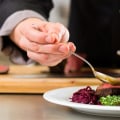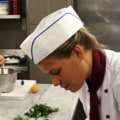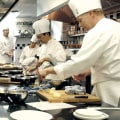The culinary school will teach you not only basic cooking methods, but also life lessons that include discipline for organization, problem solving and time management. Learn more about Culinary Arts' new %26 food operations program online here. As cooking students, we often start the day with an organized 15-minute scramble, taking and measuring all the ingredients needed for the dishes we prepared that morning. This method should also be used at home.
Once you have collected the measured ingredients on a tray, you can take them to the stove and start cooking. You'll learn how to select a knife set and how to select the right knife for the job. You'll also learn how and when to sharpen and sharpen your knife. To begin with, you should clean and sharpen your knife before or after every heavy use.
Your knife set must come with a steel for sharpening. Sharpening with a steel of approximately 15 equal points, alternating blows on each side helps to center the sharp edge of the knife, while sharpening it with a wet stone removes the layers of the blade and should be done approximately once a year. You may think that culinary school is about learning to cook, but the first thing you do is work on your knife skills. Reducing ingredients to their size consists of making them cook evenly.
If you try to roast huge pieces of potatoes together with small pieces of garlic, the latter will burn before the first one cooks well. So how do you cut oblong tube-shaped carrots and strangely shaped onion layers in the same shape as a round potato? Internship. Culinary program students learn to detect and balance flavors. Exposure to ingredients that you may have never worked with before will help you develop new taste sensations.
Developing your palate will help you create dishes with confidence, criticize dishes and season them to perfection. Culinary school can teach you how to cook, right? Well, that's partly true. But what does it mean to “know how to cook”? What you learn boils down to a lot of different factors. So perhaps a better question is: “What can culinary school teach? Different culinary schools and programs will have unique courses and objectives for their students.
But to give you an idea, here's what you can expect to find in the curriculum for online students pursuing a Diploma in Culinary Arts and Operations at the Auguste Escoffier School of Culinary Arts. What effect does heat have on food? When do you boil and when do you simmer? How is roasting different from baking? Different cooking methods are key to understanding the “why” behind a recipe. If you are thinking of enrolling in a cooking school, you should know that it will be a challenge, but it will also teach you countless lessons. I no longer cook professionally, but I use the skills I learned to become a better cook at home today.
Below, find 10 valuable lessons I learned in cooking school, take them seriously and use them to boost your own home cooking game. You can also practice starting up by organizing your kitchen. Place frequently used ingredients and tools in easily accessible areas (i.e. Don't put salt on the top shelf of your closet).
I store the salt and pepper on a small tray next to the stove and store the cooking oils and vinegars in the cupboard just above it. I group my spices by use, keeping the ones I drink most often on the front and the darker ones on the back. I have a large folder containing all the recipes I cooked at cooking school. It is divided into chapters such as hot snacks, poultry and cakes.
The biggest chapter, by far, is eggs. Here you'll find at least 30 different egg recipes, ranging from a classic French omelette to quiche and soufflé. The culinary school offers hands-on training for all types of aspiring chefs, cooks and food service workers. Whether you want to be the head chef of a high-end restaurant, a personal chef for a private home, or the owner of a catering company, culinary school may be for you.
Each culinary educational institution offers different courses and specialties depending on your professional goals and interests. The culinary industry is one where you have the opportunity to never stop learning new and exciting cooking skills as a cook, regardless of whether or not you have professional kitchen experience. In addition to normal knife work, such as dicing, slicing and chopping, you'll learn elegant knife cuts like julienne, chiffon, brunoise, roll cuts, batonnet, paysanne and tournée, the seven-sided soccer ball (and the least favorite of all, without a doubt). Learning about spice profiles is a crucial part of cooking without a recipe, something that every culinary graduate should be able to do.
It's also important to keep in mind that what you learn in cooking school will largely depend on you, as a student. While you'll never stop learning in any culinary field, it's important to keep in mind that learning is only part of the process and that it can take months and years to perfect these skills. I was studying writing with a desire to venture into gastronomic writing, so I enrolled in culinary school to learn how to cook first. One of my favorite takeaways from cooking school was to learn more than just how to cook something, but to know the best method for the cooking process.
But, as you absorb the cooking secrets that chefs learn at cooking school, you'll gain a certain confidence in the kitchen that would otherwise be hard to gain. Learning the basics is only part of the process, as being exposed to diverse cuisines and cooking styles helps you thrive in a wider range of culinary and dining environments. It's the perfect choice for those who have a passion for food and are excited to learn new cooking secrets. .
.


